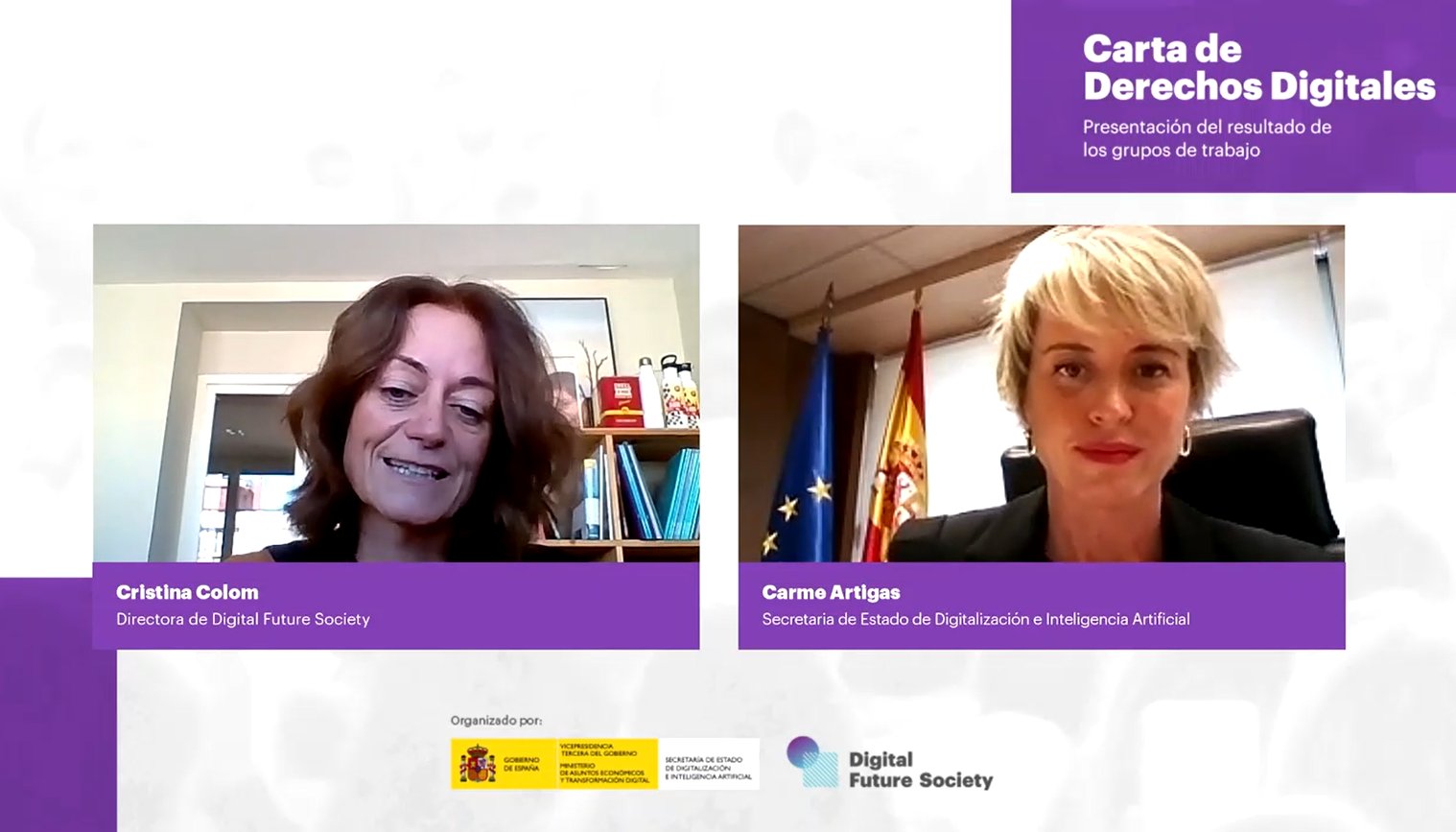
- The document, promoted by the Secretary of State for Digitalization and Artificial Intelligence, belonging to the Ministry of Economic Affairs and Digital Transformation, is written by a group of experts and includes contributions from the citizens.
- Mobile World Capital Barcelona, through the Digital Future Society initiative that studies the ethical, social and economic challenges of digital transformation, is one of the institutions that has hosted the debate about the Charter creation.

17 November, 2020
Barcelona / Madrid, 17 November 2020.- Mobile World Capital Barcelona has hosted, through the Digital Future Society initiative, a debate between the experts who have participated in the drafting of the first version of Digital Rights Charter driven by the Government of Spain in which they have explained how their work has been and what are their recommendations for the final version of the text. This document, led by the Secretary of State for Digitalization and Artificial Intelligence, belonging to the Ministry of Economic Affairs and Digital Transformation, was created with the aim of reinforcement the protection of rights and freedoms such as identity, equality, security or freedom of speech in a changing digital environment due to the disruption of technological advance. The Charter also creates protection for vulnerable groups such as the elderly, people with disabilities or minors and recognises rights in specific areas such as education, employment or health.
The telematic presentation was held today simultaneously in Madrid and Barcelona, in a digital event entitled Digital Rights Charter: Presentation of the results of the working groups. This event has had the support of secretary of State for Digitalization and Artificial Intelligence, Carme Artigas; CEO of Mobile World Capital Barcelona, Carlos Grau; director of Digital Future Society, Cristina Colom, and a wide panel of experts from the sector.
The Charter is prescriptive, not regulatory, and recognizes the challenges of application and interpretation that the adaptation of rights to the digital environment sets out, suggesting principles and policies. In this way, it proposes a framework for the public authorities’ action in a way that allows navigating in the current digital environment, taking advantage of all its potentialities and minimizing its risks. The Charter contributes to leading an essential and global process that guarantees a humanistic digital transformation, placing the people at the centre.
The secretary of State for Digitalization and Artificial Intelligence, Carme Artigas, has been in charge of presenting the content of the Digital Rights Charter content and has highlighted “today is a historic day, with the Charter, whose first results we present today, Spain becomes the pioneer country in guaranteeing the protection of digital rights, thus leading the debate on technological humanism in Europe and internationally”. Artigas has highlighted the collaborative work developed: “The Charter is the result of an intense work of different actors that began in June, we have drawnthe rights and freedoms that we want to debate, we make the first conclusions available to citizens now, because since yesterday they are already open for public consultation. We want this document has the highest consensus”.
For his part, CEO of Mobile World Capital Barcelona, Carlos Grau, stressed that “the preparation of the Charter, and the gathering of all of us here today, highlights a reality that we can no longer ignore: we are experiencing a true digital emergency and we must be aware of the fragility of the digital moment we live in, before it was toolate”. In this sense, he emphasizes that “we must create social awareness about digital emergency, we are all responsible for setting the roadmap, which has to make us move forward as a society at the same pace as the technological advances”. Grau adds: “Technology is and has to be considered as a lever for change in our society, and all those involved, both public and private sectors, have the duty to collaborate to face these challenges”.
Digital Future Society, an initiative promoted by the Ministry of Economic Affairs and Digital Transformation of the government of Spain and Mobile World Capital Barcelona, has also collaborated in the process, welcoming the debate about the Charter elaboration and making contributions about what rights should include or what ethical considerations it should take into account. In this sense, the director of Digital Future Society, Cristina Colom, has emphasized the importance of guaranteeing the protection of individual and collective rights in this context of intense progress in scientific and technological research. “The Charter is not only an opportunity to build an inclusive, fair and sustainable digital future, but also an obligation to create a new technological governance capable of measuring risks and applying accountability mechanisms”. Taking this framework into account, Colom has also pointed out the need too promote “a public-private collaboration in order to create new policies that address the digital future in a multidisciplinary and transversal way, but, above all, that it can be put into practice efficiently”.
The result of the experts’ work
A representation of the Group of Experts who were commissioned to prepare this Charter has attended the event to explain the content of the first version of the document and to discuss the principles that have motivated the Digital Rights Charter. This round table has been composed of Borja Adsuara, professor, lawyer and consultant; Moisés Barrio, lawyer for the Council of State; Manuela Battaglini, CEO of Transparent Internet; Tomás de la Quadra-Salcedo, professor of Administrative Law at Carlos III University; Susana de la Sierra, professor of Administrative Law at University of Castilla-La Mancha; and Ricard Martínez, director of the Privacy and Digital Transformation Chair at the University of Valencia.
The draft first version of the Digital Rights Charter presented today includes more than twenty rights and freedoms in the digital environment, which are is already open to public consultation. The content is divided into five large blocks. In the first place, under the title Rights of Freedom, the rights to data protection, identity, pseudonymity, not to be located and profiled, digital security and digital inheritance are collected. Secondly, in the title Equality Rights, the rights to equality and non-discrimination in the digital environment and the protection of minors, the elderly and people with disabilities are incorporated. Thirdly, under the title Rights of Participation and configuration of public space, it includes the right to Internet neutrality, freedom of speech and freedom of information, the right to citizen participation through digital environments, the right to digital education and the digital rights of citizens in their relations with public administrations. Fourth, under the title Labor and Business environment Rights, rights in the workplace and company considerations in the digital environment are collected. Fifth, under the title digital Rights in Specific environments, rights and freedoms in different areas such as scientific research, innovation, health, culture, artificial intelligence or neurotechnologies are incorporated.
The final drafting of the Charter is expected in early 2021 and will will incorporate the contributions received after this public consultation.
Socio-economic impact of the Digital Rights Charter
The very rapidly changing nature of the digital environment makes necessary to ensure the existence of a lively and open process of reflection that allows to constantly improve the adaptation of the legal framework to the new realities. This has been the premise that has promoted a second round table formed by Daniel Innerarity, professor of political and social philosophy; José Moisés Martín, general director at Red2Red Consultores and professor; Lorena Jaume-Palasi, founder of the Ethical Tech Society, AlgorithmWatch and IGF Academy; Rafael Yuste, neurobiologist and ideologist of the Brain project; Karma Peiró, co-director of the Visualization for Transparency Foundation; and Emilio Ontiveros, president of Afi and emeritus professor of economics of the company. They have debated on the social, economic and ethical aspects that must be taken into account in the Digital Rights Charter project.
TO WATCH THE PRESENTATION AGAIN Digital Rights Charter: Presentation of the results of the working groups: https://digitalfuturesociety.com/es/agenda/carta-derechos-digitales-streaming/
Stay up to date about everything
Subscribe to stay up to date with the latest content from Mobile World Capital Barcelona.